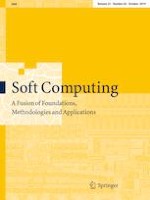04.12.2018 | Methodologies and Application
Product family flexibility design method based on hybrid adaptive ant colony algorithm
Erschienen in: Soft Computing | Ausgabe 20/2019
EinloggenAktivieren Sie unsere intelligente Suche, um passende Fachinhalte oder Patente zu finden.
Wählen Sie Textabschnitte aus um mit Künstlicher Intelligenz passenden Patente zu finden. powered by
Markieren Sie Textabschnitte, um KI-gestützt weitere passende Inhalte zu finden. powered by
